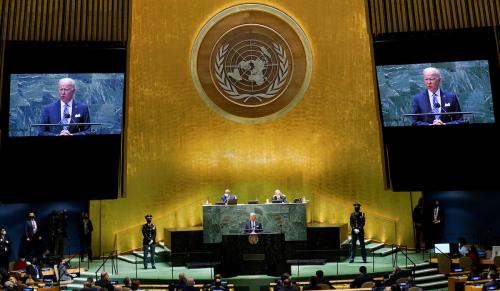Editor’s note: The Foresight Africa blog series is a collection of blog posts from Africa experts and policymakers on what they think the top priorities for Africa should be in 2014. This blog series is part of the larger Foresight Africa project that aims to help policymakers and Africa watchers stay ahead of the trends and developments impacting the continent.
As internal conflicts such as those in South Sudan and the Central African Republic continue to arise, governments and institutions in Africa are increasingly challenged to pay close attention to the problems that lead to these internal crises. Theories such as the security dilemma and conflict resolution approaches have been used by researchers to get an insight on the causes that lead to civil wars in Africa in order to assist local and regional governments in preventing violence. Despite this work, more studies on conflicts in Africa are needed to give us a better understanding of civil wars which threaten to destabilize Africa. Now, in particular, many observers have become concerned with the ubiquity of conflicts in Africa.
African politicians’ manipulation of ethnicity, regional differences and religion has unquestionably contributed to these violent internal crises. Politicians who skillfully marginalize certain ethnic groups and accumulate wealth and state resources for the benefit of a clan can exacerbate the insecurity of other ethnic groups. One of the top priorities in 2014 for Africa should be the restructuring of political parties, and the most urgent action required is the professionalization of political parties. Harvard University Professor Calestous Juma previously made a similar argument in his article, “How Tribalism Stunts African Democracy.” Juma defined the professionalization of political parties as a process of concerted efforts to build modern political parties founded on development ideas and not tribal bonds. In his analysis, Juma emphasized that political parties must base their competition for power on development platforms; therefore, neutralizing ethnic loyalty involves building modern political parties with independent African think tanks. Identity-centered political parties that pursue their tribal interests under the facade of democracy must be replaced by modern development-centered parties. This goal requires amending constitutions, stipulating the rules, and defining the criteria for establishing and operating political parties. It is crucial for political parties in Africa to have a broad national base, and not be built on ethnic, regional or religious pacts. Furthermore, political parties must have a platform that is development centered. The establishment of professional political parties in Africa will foster initiatives that will reflect the will of the masses and thus legitimize the states’ authority.
It is essential to go beyond civil wars in Africa to address politicians’ manipulation of ethnic, regional and religious differences. For example, the 2002 political crisis in Côte d’Ivoire emerged because the Akan ethnic group stayed in the presidential office for 33 years through co-optation and clientelism by the national party, the Democratic Party of Côte d’Ivoire (PDCI). Through the reigns of President Félix Houphouet-Boigny to his anointed successor Henry Konan Bédié, the voices of northern ethnic groups were silenced. President Bédié institutionalized the political concept Ivoirité, which was the first break and shift away from Houphouët-Boigny’s peaceful social policies. Ivoirité placed a value on the citizenship over the individual and on the politics over the economy. It divided the Ivoirian society along ethnic, regional and religious lines and introduced hatred for northerners—who were perceived as foreigners—while southerners were viewed as the authentic Ivoirians. Furthermore, Ivoirité excluded Bédié’s political opponent from the northern ethnic group, Alassane Ouattara, from running in the presidential election. It led to an armed rebellion that paralyzed the country for more than a decade. Similarly, the Nigerian Civil War, the war in Sierra Leone, the war in Liberia, the Rwandan genocide, and the recent conflict and tensions in Mali, South Sudan, the Central African Republic and the Democratic Republic of the Congo are all cases that underscore the importance of professionalizing political parties to prevent civil wars and minimize the adverse effect of politicians’ manipulation of these identities.
Ethnic conflict results from the breakdown of relationships, and it is vital to acknowledge that there are always fundamental similarities between the opponents. All human beings aspire to the same basic concept of peace and freedom. Therefore, the legitimate needs of all ethnic groups in a disagreement must be acknowledged in the resolution of conflict through an adjustment of the political process and social system to reduce the antagonism among the various factions. Conflict resolution involves a change in the political, social and economic systems. Ethnic groups’ needs can be addressed and prevented from escalating through the professionalization of political parties. Ethnic groups’ needs can be institutionalized to restore social relationships that have been damaged. African states should not hesitate to amend their constitutions to compel political parties to professionalize; this action will ensure peaceful social relations and strengthen African states.
It would be advisable for African leaders to add the professionalization of political parties to their agendas in the 2014 African Union Heads of States Summit later this month. This platform can serve as a launching pad for African heads of states to renew their commitments to democracy and reconcile the values of freedom and equality within their respected states. This action is manageable and can be implemented within the year to ensure that the electoral processes do not lead to conflict.



Commentary
Foresight Africa 2014: Professionalization of Political Parties – A Precondition to Peace and Stability in Africa
January 15, 2014